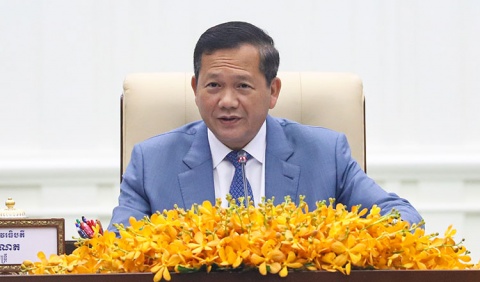
Prime Minister Hun Manet has called for continued support from development partners and the private sector to help Cambodia achieve its goal of becoming mine-free by 2030.
The call came yesterday when Mr Hun Manet led a high-level dialogue on mine action in Cambodia, with participation from development partners and the private sector to review progress made and set the direction toward achieving the goal of a mine-free Cambodia at the Peace Palace.
Mr Hun Manet said Cambodia’s mine action has gained strong national and international recognition for saving lives, turning mined land into development areas, and improving livelihoods while reducing poverty.
By the end of 2024, Cambodia has cleared and released 3,297 square kilometres (km2) of land contaminated by all forms of explosive ordnances, benefiting millions of rural people, destroying 1,197,218 anti-personnel mines, 26,567 anti-tank mines, and 3,196,704 other explosive remnants of war. While demining efforts have reduced casualties to 49 reported incidents in 2024.
The Prime Minister said these achievements have ensured the safety of millions of citizens and have gradually improved the living conditions of the people.
“Mine action in Cambodia has saved lives, transformed dangerous land into areas for development, and contributed significantly to improving the livelihoods of our people,” said Mr Hun Manet.
“However, we need continued support to achieving the goal of a ‘Mine-Free Cambodia by 2030’,”
The participants reaffirmed their commitment to continuing cooperation in mine and ERW clearance efforts, aiming to contribute to the achievement of a mine-free Cambodia.
Mr Hun Manet noted that clearing landmines is not only a matter of safety but is also integral to Cambodia’s long-term economic development. The land that has been cleared of mines is now being used for agriculture, infrastructure projects, and tourism development, helping to boost the nation’s economy and improve living conditions for its citizens.
Speaking on the occasion, the Premier also praised the Malaysian Business Chamber in Cambodia (MBCC) and its president Oknha Tan Khee Meng for actively contributing to the national landmine clearance mission, collaborating closely with local and international stakeholders.
In recent years, MBCC has helped facilitate partnerships between Malaysian companies operating in Cambodia and demining NGOs. It has also encouraged its members to contribute to mine action campaigns as part of their environmental, social, and governance (ESG) initiatives. These efforts not only promote safety and development in affected rural communities but also strengthen Malaysia-Cambodia bilateral ties.
Despite the efforts along with contributions from friendly countries and development partners, landmine explosions continue to occur every year. As of January this year, Cambodia still has 1,697 km2 of land contaminated by all forms of explosive ordnances, including 469 km² affected by landmines, 681 km2 contaminated by cluster munitions, and 547 km2 contaminated by explosive remnants of war. Of this, 424 km² is contaminated by anti-personnel mines. About one million people reside in these contaminated areas.
With the 2030 deadline in sight, Cambodia remains committed to its mine action, but the Prime Minister’s call for ongoing international support highlights the continued importance of collaboration in achieving this vital goal.
First Vice-President of the Cambodian Mine Action and Victim Assistance Authority (CMAA) Ly Thuch said yesterday that International partners reiterated their commitment to supporting Cambodia’s goal of becoming mine-free, emphasising continued cooperation in mine clearance, risk education, and victim assistance, along with strengthening technical capacity and international partnerships.
“The mobilising of funds from friendly countries is an act of generosity and humanitarian contribution from each nation, recognising that Cambodia remains one of the most heavily landmine-contaminated countries in the world,” he said.
He added that the Prime Minister has a clear strategic plan for mine clearance, which helps remove obstacles and encourages partner countries to join Cambodia in clearing ERW to help save the lives of the Cambodian people.
Cambodia has previously requested two mine clearance target extensions: the first from 2010-2019 and the second from 2020-2025. The second extension aimed for a 2025 mine-free goal but has faced difficulties, including resource limitations and the discovery of new suspected mine-contaminated areas, particularly along the Thai border.
For the third extension, the 2026-2030 period, Cambodia is committed to fulfilling its obligations under Article 5 of the Ottawa Convention and has extended its mine-free goal to 2030.




